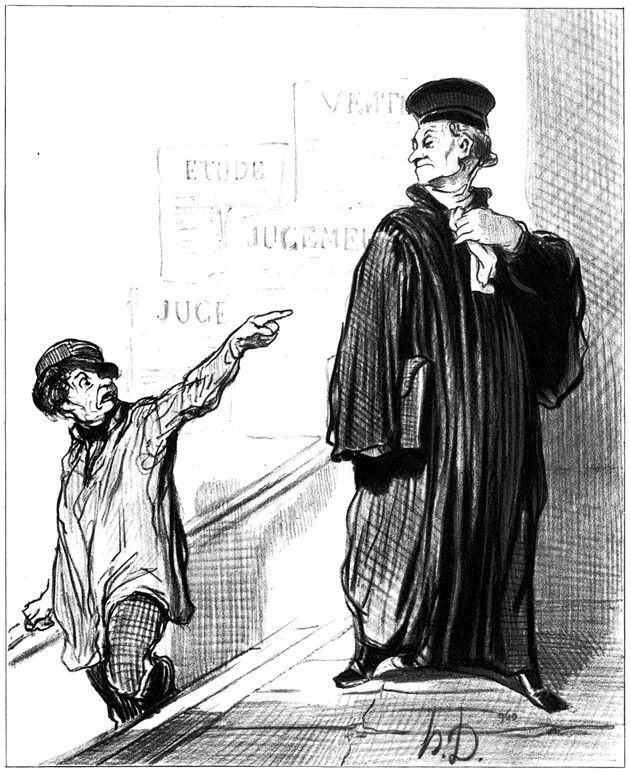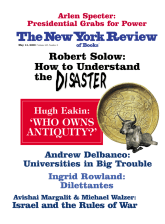In response to:
Shall We Get Rid of the Lawyers? from the April 9, 2009 issue
America has had no greater champion of the disenfranchised than Anthony Lewis, and I was pleased that, when reviewing my book Life Without Lawyers [ NYR, April 9], he acknowledged that law can go too far and undermine freedoms as well as protect them.
I respond briefly to a few points. Mr. Lewis suggests that I am guilty of hyperbole: “Do Americans really ‘tiptoe through law all day long’? I don’t.” Mr. Lewis should visit any school, hospital, government agency, or large office. While all generalizations have an element of exaggeration, the generalization that Americans are fearful in interpersonal dealings seems pretty safe. Over 90 percent of doctors admit to practicing “defensive medicine” (JAMA, June 2005). Over 80 percent of teachers say they practice what might be called “defensive teaching” (Harris Interactive, March 2004).
I wish it were true, as Mr. Lewis suggests, that my proposals are “quite modest”—for example, the proposal that judges take responsibility for drawing boundaries of reasonable claims. I’ve spoken before many judges in the last few years—to one hundred judges at Northwestern Law School last month—and their almost universal reaction is that judges currently lack this authority. This is a serious flaw in modern justice, because what people can sue for establishes the boundaries of our freedom.
Mr. Lewis suggests that I attack “judicial activism.” My main point is the opposite—that weakening authority is the common goal of right and left, and a main reason public institutions work so badly. Liberals demand “individual rights” to question any decision by officials and judges, while conservatives get to almost the same place by attacking “activism” by judges and officials, as if policy choices and fairness could be programmed like software. The shared distrust of authority means that society no longer has functioning red lights and green lights, causing many people to creep through the day, fearful of being blindsided.
Law is the framework of freedom, as Anthony Lewis so nobly has advocated for many years. But that framework requires not only individual rights, but also common choices made on behalf of all society.
Philip K. Howard
New York City
To the Editors:
Philip K. Howard is one of a number of informed observers of the legal profession who have lamented what the practice of law has been doing to America for about the last forty years.1 But, while Anthony Lewis points out in his review the absence in Life Without Lawyers of an exploration of the “deeper social causes” of the excesses of American legal practice, neither Mr. Howard nor Mr. Lewis comes to terms with the root of a problem that has been escalating at least since 1977, when the US Supreme Court decided Bates v. State Bar of Arizona, 433 US 350, permitting lawyer advertising and converting what was once a “learned profession” into a competitive, high-overhead business.
The deeper problem that accounts for the “excess of law” in the United States is the standard promotion, beginning in law school, of a war-making model of legal practice instead of a peacemaking, problem-solving model; or what Anthony Kronman, dean of Yale Law School, called “the lawyer-statesman ideal” in his book The Lost Lawyer: Failing Ideals of the Legal Profession (Harvard University Press, 1993). At its base, law is a social instrument for ordering and organizing human relations and resolving conflicts that arise within that organization. There is no necessity that its professional practitioners see themselves primarily as warriors rather than peacemakers and problem-solvers. In fact, it is well known that the vast majority of filed cases are settled outside the courts, and usually far from the courthouse door.2 The arcane rules governing what lawyers call “discovery” not only increase the cost of legal services tremendously (nicely adding to lawyers’ income), but in most cases turn out to be wasteful diversions from what should be a prudent professional process to determine the facts and efficiently discover what the real issues are between the litigants, and then work out a resolution.3
The tragedy and scandal of American legal education is that it tutors idealistic law students to become sophistical, eristic war-makers through the study of appellate litigation for that small portion of matters that will bring them to court, instead of relying on a case method instructing them on how to reconcile opposing viewpoints and settle disputes without recourse to litigation. Law schools thus generally promote cashing in on conflict instead of serving clients’ best interests through skillful negotiation. “Fewer than five percent of American law schools require their students to take any course at all in negotiation. That means that American law students are permitted to spend three years of study learning how to be tough partisan advocates without having to take even one hour to learn skills of conciliation and settlement.”4
(See Harrison Sheppard, “Cashing in on Conflict,” The Washington Post, June 5, 1996.)
Advertisement
The debate between an adversary model of legal practice and what US Supreme Court Justice Louis Brandeis referred to as serving as “counsel to the situation” before becoming an advocate is an old one. The war-making model has long prevailed as a matter of practice—in service to the economic self-interest of lawyers (who used to consider themselves quasi-public servants). Don’t the facts lamented by Mr. Howard, Mr. Lewis, and many other public-minded observers make it clear that it is now time to give peace a chance by a return to ethical notions of law as primarily an instrument of reason rather than regulated combat? It is not tort reform we need: it is reform in the model of legal education and practice of a kind that could save the economy billions of dollars annually, including helping to reduce health care costs substantially.
Harrison Sheppard
San Francisco, California
Anthony Lewis replies:
Harrison Sheppard raises important questions about the legal profession. Its larger purpose, so fundamental in this country from John Adams’s defense of the British soldiers in the Boston Massacre on, seems often to have been overwhelmed by the focus on money.
I do not think it can be blamed on the Bates case alone, or on law schools. American culture generally has been deeply affected by greed in recent decades, as hardly needs to be said. What values will recent law graduates perceive when some of them start out as associates in big firms earning $150,000 a year? Or think of what has happened to the election of supreme court judges in many states—vast campaign spending and the use of smears as wretched as those used against, say, Barack Obama. In Republican Party of Minnesota v. White in 2002 the US Supreme Court disabled efforts to regulate these campaigns by holding that state rules against campaigning for a judgeship by declaring your position on controversial issues violated the free speech clause of the First Amendment.
But underneath these unwelcome changes in the profession, I believe, many lawyers have higher ideals for it. Wall Street lawyers as well as law professors and others have volunteered to represent detainees in Guantánamo, sticking to the commitment despite abusive pressures by the government. I do not agree with Mr. Sheppard that reform of law schools or the profession can save billions for health care and the economy. But it is a good idea to think again of what led Justice Holmes to say, “it is possible to live greatly in the law.”
Philip Howard forswears attacking “judicial activism,” for which much thanks. What I had in mind was the right-wing senators and others who use that epithet to denigrate any judge or nominee who might read the law as something more profound than a bill of lading.
This Issue
May 14, 2009
-
1
See, e.g., the list of books cited in Harrison Sheppard, “American Principles and the Evolving Ethos of American Legal Practice,” 28 Loyola University Chicago Law Journal 237, 246, p. 19, with such titles as The Lost Lawyer (Anthony Kronmen) and The Betrayed Profession: Lawyering at the End of the Twentieth Century (Sol Linowitz) and including Mr. Howard’s The Death of Common Sense.
↩ -
2
See the statistics, now probably somewhat out of date but still indicative, inLoyola University Chicago Law Journal, pp. 240-241, cited in the preceding note.
↩ -
3
Ralph Nader identified discovery as the most pernicious abuse in contemporary legal practice in Nader and Wesley J. Smith, No Contest: Corporate Lawyers and the Perversion of Justice in America (Random House, 1996).
↩ -
4
Loyola University Chicago Law Journal, pp.256–257, with documentation at note 42.
↩




